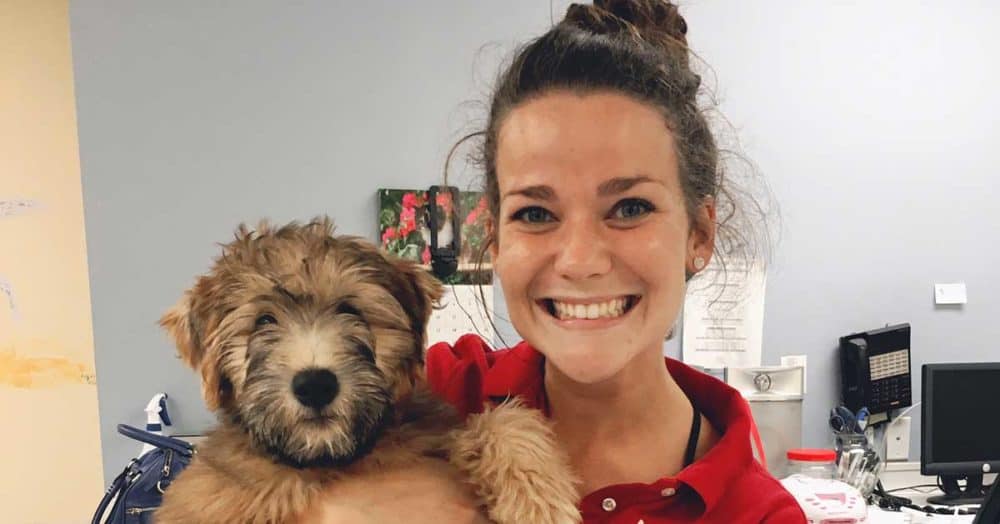October 2016 KPA CTP of the Month
Juliana Willems, KPA CTP, was an equestrian growing up, but has had no trouble switching her allegiance to dogs. As the Senior Trainer at Dog Latin Dog Training, Juliana provides private, positive training sessions directed toward any issue(s) the owner and dog are facing, always emphasizing the human-canine bond.

When Juliana worked for the Montgomery County Humane Society as an event planner, she met Beth Mullen, KPA CTP, who raved about the KPA Dog Trainer Professional (DTP) program. Beth, who became Juliana’s mentor, completed the KPA DTP program six years ago when she launched her business Dog Latin Dog Training (where Juliana works now—but that’s jumping ahead!). Juliana reports that Beth talked about KPA “almost every time I saw her. She said she felt prouder about passing the DTP course than earning her college degree from WVU!” Juliana decided then that she would challenge herself similarly and earn the KPA certification if/when she became a dog trainer.
At the Montgomery County Humane Society, Juliana began to foster dogs. Facing challenges with some dogs that she fostered, Juliana was motivated to learn more about training methods and found success with clicker training. As she says, “I was hooked!” With a desire to focus on dog training, Juliana completed the KPA DTP program with “the fabulous Laurie Luck” in early 2014, supplementing her degree in animal science from the University of Maryland.
Although she was “pretty well-versed in clicker training and operant conditioning before starting the program,” Juliana recalls discovering that she was “sloppy” with basics like mechanics, timing, cueing, and treat delivery. “I felt like it was a miracle I’d ever taught a dog anything!” declares Juliana. She partnered with “borrowed” dog, six-month old pit mix Paco. Juliana describes Paco as goofy and energetic, but with a “lazy, ‘really, you’re going to ask me to do that again?’side.” The program challenges came in Juliana’s work with Paco. “I had to work so hard to keep him engaged.” When she discovered that Paco’s favorite treat was playing tug, their work became easier.

I’m glad I worked with a dog that was so challenging. It made me a much better trainer in the end.

Within a year of completing the KPA course, Juliana made the switch to fulltime dog training. She is employed as part of the behavior team at the Washington Humane Society (WHS)—and she joined Dog Latin Dog Training! “The knowledge I gained from the DTP program, and continue to get via continuing education opportunities like ClickerExpo, helped me build my Dog Latin Dog Training client base.” Juliana believes that “when you’re a good trainer—especially a good clicker trainer—you get results, and you get them fast.” Results and success are what pet owners are looking for “especially in a city like Washington, DC, that is in constant motion.”
In her sessions with clients, Juliana finds that there are many times when only a small or short amount of training is required. “Then, I need to be able to show up, teach them how to communicate what they want to their dog effectively, and then leave!” Juliana says she loves the fast-paced nature of her city-based clients. “The skills I learned in KPA have been essential in keeping up.”
Other times, of course, the training challenges are more intense and require more time and ingenuity. In her client work, Juliana encounters many reactive dogs. “The downside of living and working in a city is that I see reactivity constantly. The city environment is hard for dogs because they are all on top of each other!” In DC, Juliana finds that many rescues and shelters are pulling dogs up from further south. “These dogs are barely used to living in a house, let alone an urban environment.” When Juliana works with an owner and dog struggling with reactivity, both learners “let out a sigh of relief that they finally have a line of communication with the clicker!”
Juliana says that her favorite part about working at the Washington Humane Society is that there are clickers all over the shelter! The clickers are used consistently throughout the shelter.

Each of our adoptable dogs is clicker trained by volunteers, our staff uses clicker training with our off-view dogs, and we hand clickers out to our adopters. The crystal-clear communication from a clicker is something a shelter dog is often craving.

She has found thateven five minutes of clicker training a day can teach a dog that behavior can have a positive consequence. This lesson, according to Juliana, “can have an enormous impact on dogs’ mental well-being.”
Outside of her professional life, Juliana can also see the impact of her KPA exposure. “One of the most life-changing parts of becoming a good clicker trainer is the way it has led me to interact with people.” She focuses on the good, phrases instructions or critiques in a positive way, is clear setting criteria, and studies how she can change her teaching to help a learner be more successful. “What a difference that has made for my people skills! Interacting with my colleagues at the shelter, or my Dog Latin clients, or even within my own personal relationships, my clicker skills have made me a much better communicator.”
Juliana completed (and endorses!) KPA’s Puppy Start Right for Instructorscourse before she enrolled in the DTP program. Although she has not completed the KPA Shelter Training & Enrichmentcourse, shelter colleagues have been through the course and shared the positive experience. A repeat guest on The Pet Show with Dr. Katy(broadcast on News Channel 8 from Washington, DC), Juliana has used that media exposure as another means to support positive training. Watch Juliana’s most recent appearanceon Dr. Katy, or watch an appearance with Dr. Katy from last year that talks specifically about clicker training (start at approximately 8:10).
Looking to her future, Juliana plans to continue her work improving the human-canine bond. “That is what clicker training is all about.” Her goal is for society to realize that “you can build a bond with your dog, teach the dog how to be well-behaved, and have fun—all using positive reinforcement!” With that realization, Juliana hopes for a dog-training culture “that no longer believes in the use of force or fear, but instead promotes respect, kindness, and science working with our dogs.”

